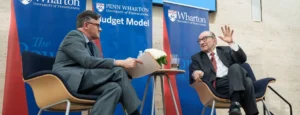Applicants to Wharton’s EMBA program can choose which standardized test to take: the GMAT, GRE, or Executive Assessment. With a quantitative background, Mary Kroening, WG’22, chose the GMAT because she felt that it would be the best fit for her math skills.
After deciding on a test, it was time to start preparing.
1. Create a strategy.
Mary’s first step was to create a study strategy. She decided to wake up a few hours early every day and allocate that time for GMAT preparation before work. She also allocated spare time after work and anywhere from four hours to a full day to study on the weekends.
Her next step was to decide which study materials to use. Mary chose to use the free materials provided by the GMAT and also to purchase a series of preparatory books, which included lessons by topic, practice problems, and tests. One of those books included a suggested study agenda, so she went through the lessons and practice problems based on that schedule. When the books offered optional practice problems that were more difficult, she made sure to do those too.
“The key was studying consistently most days instead of just spending an hour or two a week. I also made sure to understand the most efficient way to solve problems, which was often different from what I learned in high school. There are tricks and problem solving mechanisms that can help you complete the problems faster, which is important in a timed test,” she explained. “A beneficial way to learn how to identify the applicable tricks for each problem type is to practice a high volume of problems in a timed setting.”
Mary also took seven full practice tests. She took two early on to get a sense of her strengths and weaknesses, and she took the others as she got closer to her actual test date. She noted, “The practice tests in the book I used were harder than the free practice tests provided by the GMAT. While the more challenging tests were extremely beneficial, my results from the published GMAT tests were more indicative of how I did on the actual test.”
2. Focus on time management.
In addition to learning how to solve the problems, Mary focused on time management skills. For the quantitative, or “quant” section, she broke up her scratch paper into quadrants and wrote timestamps at the bottom of the page to keep her on track throughout the test. For example, if each problem should take two minutes to finish, she would note the time she should be at when she completed that page of problems.
“A big strategy is not getting bogged down on trickier questions. If I spent three minutes on a problem, that was too long. I had to learn when to make an educated guess, rule answers out, and move on. It’s important to finish all of the problems in the section or you get penalized,” she said.
3. Plan ahead for Test Day.
Mary noted that test takers can choose the order in which they take the sections on the test. “Decide on the order of the sections in advance, so you aren’t thrown off when you arrive on test day. You can take practice tests in different orders to see what works best for you. I started with the quant section because that would be the most mentally draining for me, and I wanted to be the sharpest when I answered those questions.”
On test day, Mary suggested eating a good breakfast and arriving early to avoid any unnecessary stress. “Have a plan for how you will arrive at the test location and give yourself at least a 15-minute buffer. That applies for breaks too. You can leave the room for allocated breaks, but they do not give you a warning when your break time is up. If you are late getting back to the room and there is a line of people, you may lose valuable time you could have spent on your test.”
Finally, she said to decide in advance on the minimum score you will accept. “When the test is over, you will see your score and can either accept or decline to use it. I accepted my score, but I also did a phone chat with a member of the Wharton EMBA admissions team to confirm if my score was in line with their expectations. It was a helpful discussion and gave me the confidence that I was in the right range.”
Overall, Mary advised, “Make studying for the test a priority and be self-disciplined about it. It is time well spent because not only will it help you succeed on test day, but establishing a routine gets you back into the habit of studying every day, which is necessary to succeed in this program.”
— Meghan Laska
Posted: January 4, 2021




















